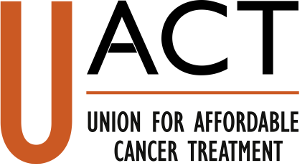UACT has submitted comments to the United States Trade Representative regarding the 2018 Special 301 Review. UACT’s comments can be found as a pdf here and copied in full below:
1621 Connecticut Avenue NW
Suite 500
Washington, DC 20009
Tel.: 202.332.2670
www.uact.org
February 6, 2018
Sung Chang
Director for Innovation and Intellectual Property
United States Trade Representative
Docket No. USTR-2017-0024
Via submissions made through the Federal eRulemaking Portal: http://www.regulations.gov.
Dear Sung Chang,
Re: UACT Comments Regarding the 2018 Special 301 Review
The Union for Affordable Cancer Treatment (UACT), created in 2014, is a union of people affected by cancer, their family members and friends, people who take care of people with cancer, health care professionals and cancer researchers committed to increasing access to effective cancer treatment and care. We are particularly concerned about the rapidly escalating cost of cancer medication in the US and globally. We request the opportunity to testify at the Special 301 hearing on February 27th, and respectfully submit the following comments.
As noted in the summary of the Federal Register Notice, “Each year, the Office of the United States Trade Representative conducts a Special 301 review to identify countries that deny adequate and effective protection of intellectual property rights (IPR) or deny fair and equitable market access to U.S. persons who rely on intellectual property protection.”
Based on this review, the USTR identifies so-called “Priority Foreign Countries” whose acts, policies, or practices may be contrary to the interest of a few often multinational companies, even if done in accordance with well-established trade rules as defined in the TRIPS. For most of these “target” countries, trade sanctions or even the threat of trade sanctions by the United States can result in terrible outcomes for many citizens, especially cancer patients who need improved access to better medicines everywhere.
Many countries, from Norway or the Netherlands to Chile or India, may be identified by the USTR review but in fact have national health policies that allows their officials to challenge patents on medicines and the prices of medicines if doing so is in their citizens interests and in accordance with local laws. By putting pressure on these countries with all the power it has as a huge market, the US, USTR and its staff asked countries to let many patients die prematurely. Medicine should not be treated as bargaining chips to be traded as other commodities. It is time the USTR recognize fully and respect the words as well as the spirit of the Doha Declaration.
UACT reminds USTR that the Doha Declaration on the TRIPS Agreement and Public Health was adopted by the WTO Ministerial Conference of 2001, and reaffirmed the flexibility of TRIPS member states in circumventing patent rights for better access to medicines. In Paragraph 4 of the Doha Declaration, governments — including the US government — agreed that:
“4. The TRIPS Agreement does not and should not prevent Members from taking measures to protect public health. Accordingly, while reiterating our commitment to the TRIPS Agreement, we affirm that the Agreement can and should be interpreted and implemented in a manner supportive of WTO Members’ right to protect public health and, in particular, to promote access to medicines for all.
Using political tools that only appear to respect the legal safeguards put in place by the WTO but in fact undermine access to medicines is unacceptable to US citizens, and to patients all over the world. Trade pressures should not be used to undermine access to medicine as a human right, but should be used to strengthen access to medicines as a human right.
The USTR has a role to play in protecting U.S. interests, but has options other than to advocate for higher drug prices around the world. As Secretary of HHS Alex Azar noted during his confirmation hearing, the United States benefited when the European Union expanded public sector funding for biomedical research through the Horizon 2020 Framework programme for Research and Innovation. And, various members of the World Health Organization and the UN Secretary General’s High Level Panel on Access to Medicine have proposed negotiations to expand global public sector funding of research of development, and to explore new ways of delinking R&D costs from the prices of medical technologies, and enhancing the transparency of pharmaceutical markets, including everything from R&D costs, prices and revenues, and government subsidies for R&D to outcomes of clinical trials, marketing costs, patent and registration landscapes and the knowhow to make products, including biologic drugs and the new CAR T and other gene and cell based technologies.
Given the repeated promises by President Trump to give people relief from high drug prices, it is time for USTR to rethink its objectives in trade policy.
Respectfully submitted,
Manon Anne Ress. PhD. Acting Director and Co-founder, Union for Affordable Cancer Treatment
